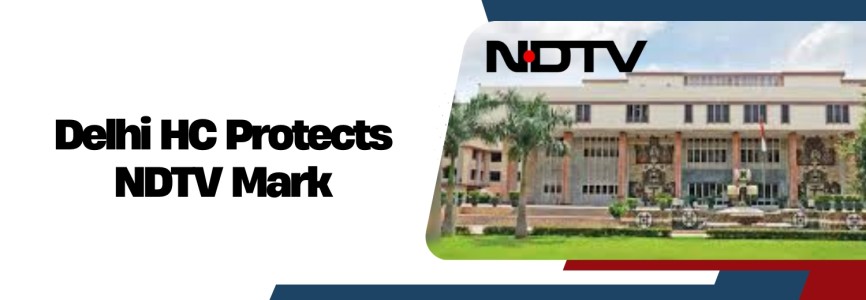The Delhi High Court has once again shown how important it is to protect intellectual property (IP) rights in the digital world. In a recent case, the Court granted relief to NDTV (New Delhi Television), one of India’s oldest and most respected news broadcasters. NDTV has been using its mark “NDTV” since 2003 and has built strong trust with viewers over the years.
Some people tried to misuse the NDTV name by creating fake websites, social media pages, YouTube channels, and messaging groups. These fake accounts looked like NDTV’s official platforms and could easily mislead the public. NDTV filed a case to stop this misuse, and the Court stepped in quickly.
Background of the Case
NDTV explained to the Court that the defendants were using the NDTV mark without any permission, which amounts to trademark infringement. They were also pretending to be NDTV, which is a clear case of passing off. Along with this, the defendants were also copying NDTV’s logos and other creative work, which is a copyright violation. NDTV said that if this continued, it would seriously damage its goodwill and the trust that the public has in the channel.
Relevant Provisions under Trademarks Act, 1999
The Court relied on important provisions of Indian law:
Section 29, Trademarks Act, 1999
This section deals with trademark infringement. Using a registered mark like “NDTV” without permission is infringement. In this case, defendants used the exact same mark “NDTV” for websites and channels, which is a clear violation.
Section 27, Trademarks Act, 1999
Even if a mark is not registered, an owner can take action through passing off. NDTV’s mark is registered and also well-known, so it is protected under both infringement and passing off.
Section 135, Trademarks Act, 1999
This section provides remedies like injunctions, damages, or seizure of goods. Here, the Court granted an injunction (stop order) to immediately protect NDTV.
Copyright Act, 1957
NDTV’s logos, graphics, and original content are protected under copyright law. Copying these elements on fake websites and channels amounts to copyright infringement.
Facts of the case
The Court considered three main points before granting relief:
-
Prima Facie Case: NDTV proved that it owns the mark “NDTV” and that the defendants were misusing it.
-
Balance of Convenience: The harm to NDTV’s reputation was far greater than any loss to the defendants if they were stopped.
-
Irreparable Harm: If fake accounts continued, NDTV’s goodwill built over 20 years could be damaged permanently.
Because all three conditions were satisfied, the Court granted the injunction.
Importance of the Case
This case is a reminder of how quickly trademark misuse spreads online. In the age of social media and digital platforms, fake websites and channels can mislead thousands of people within minutes.
The Court’s strong order shows two things:
Famous brands need strong protection. NDTV is a household name, so misuse can cause serious damage.
Digital platforms must act fast. The order directed YouTube, Telegram, and others to block content within 48 hours. This creates accountability for tech companies.
Delhi High Court Ruling
On August 20, 2025, the Delhi High Court passed an ex-parte ad-interim injunction (a temporary order passed without hearing the other side, to prevent immediate harm).
The two main defendants must stop using the NDTV mark.
Platforms like YouTube, Telegram, X (Twitter), and Meta must:
Suspend or block 13 fake websites and 35 YouTube channels within 48 hours.
Share the names and details of the people running these accounts within three weeks.
The Court noted that NDTV’s brand is well-known and trusted. If the misuse continued, it would cause irreparable harm to NDTV’s goodwill and reputation.
Conclusion
The Delhi High Court’s ruling in favor of NDTV is a big step in protecting intellectual property rights in India. It shows that courts are ready to act swiftly against online misuse of trademarks. For businesses, it is a lesson to keep their trademark registration and actively monitor misuse. For the public, it is a reminder to be careful of fake accounts and websites pretending to be trusted brands.
FAQ's
Q1. What was the main issue in NDTV’s case before the Delhi High Court?
Ans. The main issue was the misuse of NDTV’s registered trademark “NDTV” by third parties who created fake websites, YouTube channels, and social media pages pretending to be the official NDTV platforms.
Q2. Why did the Court grant an injunction in favor of NDTV?
Ans. The Court found that NDTV had established a prima facie case of trademark infringement, passing off, and copyright violation. Since the misuse could cause irreparable harm to NDTV’s goodwill, an immediate injunction was necessary.
Q3. Which provisions of the Trademarks Act, 1999 were applied in this case?
Ans. Section 29: Trademark infringement
-
Section 27: Passing off action
-
Section 135: Remedies such as injunctions and damages
Q4. Did the case also involve copyright law?
Ans. Yes. NDTV’s logos, graphics, and creative content are protected under the Copyright Act, 1957. Copying these elements on fake websites and channels amounted to copyright infringement.
Q5. What directions did the Delhi High Court give to digital platforms like YouTube and Telegram?
Ans. The Court ordered platforms to block or suspend 13 fake websites and 35 YouTube channels within 48 hours and to provide the details of the persons operating these accounts within three weeks.
Q6. What is the significance of this ruling for businesses?
Ans. This ruling highlight the need for businesses to:
-
Register their trademarks,
-
Actively monitor online misuse, and
-
Take swift legal action to protect their goodwill in the digital space.
Q7. How does this ruling protect consumers?
Ans. By blocking fake accounts and channels, the Court’s order prevents the public from being misled by imposters posing as NDTV, ensuring that viewers rely only on authentic sources of news.






























_(b)_of_the_Trademark_Act,_1999_(1)_crop10_thumb.jpg)



_crop10_thumb.jpg)




























_crop10_thumb.jpg)
_crop10_thumb.jpg)






_crop10_thumb.jpg)








_crop10_thumb.jpg)



_crop10_thumb.jpg)





























_crop10_thumb.jpg)

















_crop10_thumb.jpg)






_crop10_thumb.jpg)












































































































































_crop10_thumb.jpg)




































_crop10_thumb.jpg)












_crop10_thumb.jpg)















































_crop10_thumb.jpg)

































































































